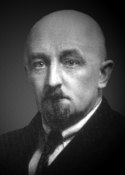
Gurdjieff International Review
A Special Evening
at the Essentuki Social Club
From the Notes of Thomas C. Daly
Thomas de Hartmann was never one to trumpet his own importance. He never pushed himself forward as some others did. His level of self-integrity has become more and more evident as time goes by. On the way to self-development he has not stinted to record his own essence weaknesses, and how Gurdjieff worked on them to help him overcome them through real suffering of a positive kind, as evidenced by incidents throughout his story. The “special evening” in Essentuki at the social club comes to mind as an example:
One morning when I passed through the centre of Essentuki, I noticed a poster advertising a special evening at the social club and had the desire to sit peacefully in the corner watching people dance. Later in the day when I walked with Mr Gurdjieff and Dr Stjernvall, I spoke of this quite casually.
‘Doctor, you hear? He’s inviting us to the club this evening. What? Will you invite us for supper? Let’s go, Doctor. Thank you for your invitation!’
This was bad. A supper during the inflation cost a tremendous amount of money and I no longer had any money coming in each month. But there was nothing for it but to go ahead with this plan, because I hadn’t the courage to say no. That evening I took 500 roubles (in former times a supper in the best restaurant would come to no more than two and a half roubles) and went to the club. It was almost empty; there was no dancing and only the restaurant was open. Now my hell began. Mr Gurdjieff played with me as if I were a child to whom he wished to teach a lesson. ‘Well, Doctor, since he’s treating us, come on; it would be nice to start with some vodka and hors d’oeuvres. Then later…’ It went on and on. I vividly remember to this day the oranges he ordered, because then I knew that my 500 roubles would never pay the bill. I did not have the courage to tell Mr Gurdjieff I didn’t have enough money and ask him to lend me some until we got home. How could I get out of this situation? It was agonizing. Finally I decided to tip the waiter and send him to my wife for more money. She was frightened when a stranger knocked at our door in the night. But finally the money was brought and I paid for everything. The bill came to about 1,000 roubles, enough for us to live on for half a month.
Next morning Mr Gurdjieff came to see us and gave me the money I had spent on the supper. He said, ‘Sometimes you act like a lamb and the tigers will eat you up. It is good that you have a tigress near you.’ This was another extremely painful moment—not from the ordinary point of view, but because I realized that I did not know how to behave like a grown-up man. Mr Gurdjieff had told me so several times, but only now did I believe it. That morning Mr Gurdjieff was not at all as he had been the evening before, there were no reproaches, no raillery. All he said was that what happened had been done for my sake.*
As to de Hartmann’s stature in the history of the Work, it is my feeling that he will always be remembered as one of three individuals whom Gurdjieff worked with and developed to the point of leaving behind, as it were, “legomonisms” of particular aspects of his teaching—P. D. Ouspensky for his Ideas, Jeanne de Salzmann for his Movements, and Thomas de Hartmann for his Music.
* Thomas and Olga de Hartmann, Our Life with Mr Gurdjieff: Definitive Edition (1992) London: Penguin Arkana, pp. 41–42.
|
Copyright © 1999 Thomas C. Daly This webpage © 1999 Gurdjieff Electronic Publishing Featured: Summer 1999 Issue, Vol. II (4) Revision: January 1, 2000 |